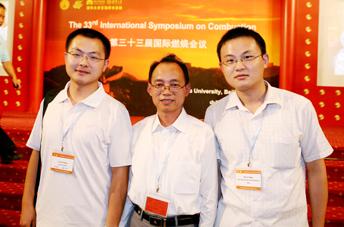Dr. LI Yuyang, a postdoctor from University of Science and Technology of China (USTC), received the Bernard Lewis Fellowship at the 33rd International Symposium on Combustion held on August 2-6th, 2010, in Beijing. He was the first recipient from domestic universities and institutes since the Fellowship was established in 1996.
Bernard Lewis Fellowship, named after Professor Bernard Lewis who was the founder of Combustion Institute, was established by the Combustion Institute to encourage high quality research in combustion by young scientists and engineers who have received their last educational degree within three years. This biennial fellowship is customarily awarded to recipients at the International Symposium on Combustion held in the same year. There were six recipients worldwide this year.
Dr. LI received his PhD from National Synchrotron Radiation Laboratory (NSRL) of USTC in July, 2010 under supervision of Professor QI Fei. Dr. LI's research interest includes combustion chemistry of aromatic fuels and applications of synchrotron vacuum ultraviolet (VUV) photoionization mass spectrometry. He developed reaction mechanisms of benzene, toluene, styrene, ethylbenzene, and xylenes to understand decomposition processes of these fuels and formation processes of polycyclic aromatic hydrocarbons (PAHs) and soot in flame conditions. He published over 30 papers in noted peer-reviewed journals, such as Accounts of Chemical Research, Combustion and Flame, Proceedings of the Combustion Institute, and Energy and Fuels. Professor H. Wang from University of South California, a famous scientist in combustion chemistry, highlighted Dr. LI's work in his plenary lecture in this symposium: "Recent advance in probing flame by synchrotron VUV photoionization mass spectrometry will be critical to further progress in formation mechanism of PAHs and soot".
Closely related with energy and environment, combustion is attracting worldwide attention and becomes a prior-developing subject by most developed countries. The receipt of Bernard Lewis Fellowship by Dr. LI not only indicates that the combustion study at USTC has been recognized by international combustion community, but also represents the leading position in domestic combustion community.
Furthermore, Dr. TIAN Zhenyu is another recipient of Bernard Lewis Fellowship this year. He also graduated from Professor QI's group in 2008, and now is a postdoctor in CNRS, France.

(Tian Zhenyu, Qi Fei and Li Yuyang)
Related News
Photos
More>>history
- World Bank President Robert B. Zoellick Meets with USTC Students
- USTC Signs Memorandum of Cooperation with University of Cambridge
- UO, USTC Signs a Cooperation Agreement on Archaeology
- Seminar On 973 program - Research on Basic Scientific Problems for Magnetic
- Anhui's University Hip-Hop Dance Competition Sparkles to the End in USTC Campus
Traditions
- USTC Received the First Grant Reward from the Bill and Melinda Gates Foundation
- Operating a Microwave Oven after Reading the Manual Special Show of USTC Service
- High Commissioner of French Commissariat l' nergie Atomique Visits USTC
- USTC Harvests High Percentage of Well-Cited Papers for 2009
- Muslim Students in USTC celebrate Corban Festival
arts
- iGEM: USTC Won 2 Gold Medals and the Best Software Tool Award
- Prof. Zhengyao Jin: Attending the Fifth Forbes Symposium as an Invited Speaker
- USTC Magnetic Suspension Chimes: A Stunning Debut at Shanghai Expo Closing
- Baidu CEO Li Yanhong Shared Vision with USTC Students
- President Hou Jianguo attended the 16th Annual Meeting of AEARU





